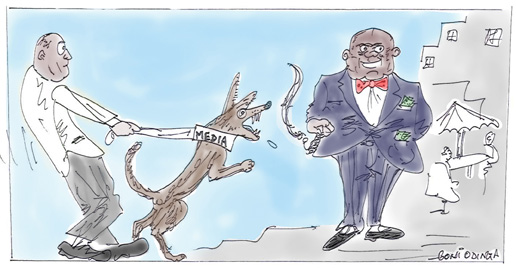 For nine days and with no explanation, 8.4 million customers of Equity Bank were unable to withdraw cash from ATMs forcing them to rely on over-the-counter manual withdrawals.
For nine days and with no explanation, 8.4 million customers of Equity Bank were unable to withdraw cash from ATMs forcing them to rely on over-the-counter manual withdrawals.
The customers waited patiently for the mainstream media to shed light on what had caused the hitch in vain. A statement from the bank on what caused the collapse of the bank’s information technology system only came on the ninth day.
The incident and other similar happenings illustrate how the corporate world dictates media content and make nonsense of the theory that the media’s major role is to serve public interest.
The event that came in the wake of the recent Ipsos and Infotrak polls conducted between May and June that showed that the media is the most trusted institution, after the presidency, illustrates the extent to which the public is ignorant of the going-ons in the media.
For days no media house, including community ones, reported the incident causing the customers to turn to social media to vent their frustrations.
A June 2010 report by Peter Oriare, Rosemary Okello-Orlale and Wilson Ugangu dubbed The media we want affirmed that Kenyans “…want media that respect and operate under the principles of public interest and impartially balance competing interests against the attention and susceptibilities of different audiences in Kenya.”
Balancing between commercial and public interest is what should guide content in media, stated the report which was sponsored by the Friedrich Ebert Sifting Institute. This Equity Bank case however brings to the fore just how commercial interests reign supreme at the expense of the public.
Media expert Dr. George Gathigi is of the opinion that there is a general lack of critical discourse in the media, especially when it comes to matters affecting the corporate world. He says the media environment in Kenya has something to do with why many media houses treat big private companies like sacred cows. “The Kenyan media environment is very competitive and everyone is trying to stay afloat. In the process, each wants to clinch a major advertiser,” he says.
“Another reason could be that the media houses have some financial relationship with the private companies. You could find that many of them have loans from banks or even individual journalists hence the restraint in reporting on them,” he adds.
The Equity Bank caseis just one of recent cases in which public interest has been relegated to the periphery. Just last week, Kenya Airways had troubles with its flight KQ117 from Amsterdam to Nairobi which was diverted to Athens after a fire warning. The media did not ask the hard questions leading to speculation on social media about the dire situation for the plane’s passengers who had no transit visas but were stuck in Greece.
The bank’s statement blamed a system upgrade for the inconvenience.
“Equity Bank has in the last few days experienced delays in service delivery caused by a process of enhancing our data storage capacity to enable us increase our offering on our delivery channels especially ATMs. The delays were not foreseen or expected as we had envisaged seamless backend operations without affecting our customers’ experience,” it stated.
Advertisers pay colossal amounts to media houses. For instance, it costs an average of Sh400, 000 to publish a whole page in the daily newspapers. An infomercial, a mention in radio, is charged depending on the time of the day. Peak hours could cost an average of Sh3,500 for community radios and Sh30, 000 for commercial stations per mention. This does not include adverts in radio which are also charged per second depending on the time of day. For TV, it costs an average of Sh350,000 per second to advertise during news bulletins in the evenings.
Influential advertisers in Kenya include Coca Cola, Safaricom, East African Breweries Limited (EABL), Kenya Airways, Equity, Barclays Bank and Standard Chartered Bank. Every media house tries its best to have a share of the advertising millions companies reserve per financial year. Editors are always under pressure to give more space to adverts than stories, thereby violating common international standards of 60 to 40 per cent for news and advertisements, respectively.
According to data from Ipsos Synovate, in the first quarter of 2012, Sh18.3 billion was spent in advertising. This amount is the total value of the advertising booked and does not include discounts and value addition which media houses provide. Media houses give a standard price for their adverts and pay advertising agencies from this same amount meaning that the amount above includes agency commissions.
Public interest is pushed to the back burner when commercial interests are at play. The Fourth Estate has a long way to go in putting public interest first. Perhaps the Equity Bank scenario will revive the debate among media stakeholders on whether we need a public broadcaster which does not rely on adverts and is funded from the consolidated fund, like the BBC in Britain. This may be the only way out but it remains to be seen since even those in power have major interests in media and would want to continue minting millions from advertisements to continuously boost their investments.
Besides, a public broadcaster will not completely solve the media-commercial interest predicament. Public broadcasters invariably become beholden to the government of the day, once again shelving public interest. These dilemma and other issues perhaps would be ideally discussed and resolved by the Media Owners Association. But media practitioners must draw the line which advertisers cannot cross. The MOA should approach and veto punitive corporate, who usually gives the media slack whenever their infractions make the headlines.

